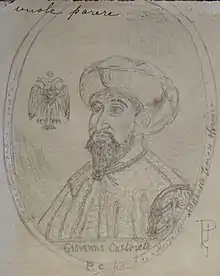Gjon Kastrioti II
Gjon Kastrioti II or John Castriot II (Italian: Ioanne Castrioto,[1] Giovanni Castrioto;[2]1456–1502), was the son of Gjergj Kastrioti Skanderbeg, the Albanian national hero, and of Donika Kastrioti, daughter of Gjergj Arianiti. He was for a short time Lord of Kruja after his father death, Duke of San Pietro in Galatina (1485), Count of Soleto, Signore of Monte Sant'Angelo and San Giovanni Rotondo. In 1495 Ferdinand I of Naples gave him the title of the Signore of Gagliano del Capo and Oria. While in his teens he was forced to leave the country after the death of his father in 1468. He is known also for his role in the Albanian uprising of 1481, when, after reaching the Albanian coast from Italy settling in Himara, he tried to struggle against the Ottomans.[3] In June 1481 he supported forces of Ivan Crnojević to successfully recapture Zeta from Ottomans.[4] He was unable to re-establish the Kastrioti Principality and liberate Albania from the Ottomans, and he retired in Italy after three years of war in 1484.[3]
Gjon Kastrioti II | |
|---|---|
 Pietro Cavoti after his often visit to the house of the Galatian family he found an "antique drawing", namely the portrait of Gjon II Kastrioti, which he immediately copied, and marked the date of realization March 6. 1857 | |
| Born | 1456 |
| Died | 1502 |
| Noble family | |
| Spouse | Jerina Branković |
| Father | Skanderbeg |
| Mother | Donika Kastrioti |
Family
He married Jerina Branković,[1][2] daughter of Serbian Despot Lazar Branković.[5] They had the following issue:
- Giorgio (died 1540),
- Costantino Castriota (1477–1500), Bishop of Isernia
- Ferrante[2] (d. 1561), duke of San Pietro in Galatina
- Maria[2] (d. 1569)
The Castriota descendants living in Italy today represent the only descendants of Manuel II Palaiologos, great-grandfather of Jerina.[6]
See also
| Ancestors of Gjon Kastrioti II | |||||||||||||||||||||||||||||||||||||||||||||||||||||||||||||||||||||||||||||||||||||||||||||||||||||||||||||||||||||||||||||||||||||||||||||||||||||||||||||||||||||||||||||||||||||||||||||||||||||||||||||||||||||||||||||||||||||||||||||||||||||||||||||||||||||||||||||||||||||||||||||||||||||||||||||||||||||||||||||||||||||||||||||||||||||||||||||||||||||||||||||||||||||||||||||||||||||||||||||||||||||||||||||||||||||||||||||||||||||||||||||||||||||||||||||||||||||||||||||||||||||||||||||||||||||||||||||||||||||||||||||||||||||||||||||
|---|---|---|---|---|---|---|---|---|---|---|---|---|---|---|---|---|---|---|---|---|---|---|---|---|---|---|---|---|---|---|---|---|---|---|---|---|---|---|---|---|---|---|---|---|---|---|---|---|---|---|---|---|---|---|---|---|---|---|---|---|---|---|---|---|---|---|---|---|---|---|---|---|---|---|---|---|---|---|---|---|---|---|---|---|---|---|---|---|---|---|---|---|---|---|---|---|---|---|---|---|---|---|---|---|---|---|---|---|---|---|---|---|---|---|---|---|---|---|---|---|---|---|---|---|---|---|---|---|---|---|---|---|---|---|---|---|---|---|---|---|---|---|---|---|---|---|---|---|---|---|---|---|---|---|---|---|---|---|---|---|---|---|---|---|---|---|---|---|---|---|---|---|---|---|---|---|---|---|---|---|---|---|---|---|---|---|---|---|---|---|---|---|---|---|---|---|---|---|---|---|---|---|---|---|---|---|---|---|---|---|---|---|---|---|---|---|---|---|---|---|---|---|---|---|---|---|---|---|---|---|---|---|---|---|---|---|---|---|---|---|---|---|---|---|---|---|---|---|---|---|---|---|---|---|---|---|---|---|---|---|---|---|---|---|---|---|---|---|---|---|---|---|---|---|---|---|---|---|---|---|---|---|---|---|---|---|---|---|---|---|---|---|---|---|---|---|---|---|---|---|---|---|---|---|---|---|---|---|---|---|---|---|---|---|---|---|---|---|---|---|---|---|---|---|---|---|---|---|---|---|---|---|---|---|---|---|---|---|---|---|---|---|---|---|---|---|---|---|---|---|---|---|---|---|---|---|---|---|---|---|---|---|---|---|---|---|---|---|---|---|---|---|---|---|---|---|---|---|---|---|---|---|---|---|---|---|---|---|---|---|---|---|---|---|---|---|---|---|---|---|---|---|---|---|---|---|---|---|---|---|---|---|---|---|---|---|---|---|---|---|---|---|---|---|---|---|---|---|---|---|---|---|---|---|---|---|---|---|---|---|---|---|---|---|---|---|---|---|---|---|---|---|---|---|---|---|---|---|---|---|---|---|---|---|---|---|---|---|---|---|---|---|---|---|---|---|---|---|---|---|---|---|---|---|---|---|---|---|---|---|---|---|---|---|---|---|---|---|---|---|---|---|---|---|---|---|---|---|---|---|---|---|---|---|---|---|---|---|---|---|---|---|---|---|---|---|---|---|---|---|---|---|---|---|---|---|---|---|---|---|---|
| |||||||||||||||||||||||||||||||||||||||||||||||||||||||||||||||||||||||||||||||||||||||||||||||||||||||||||||||||||||||||||||||||||||||||||||||||||||||||||||||||||||||||||||||||||||||||||||||||||||||||||||||||||||||||||||||||||||||||||||||||||||||||||||||||||||||||||||||||||||||||||||||||||||||||||||||||||||||||||||||||||||||||||||||||||||||||||||||||||||||||||||||||||||||||||||||||||||||||||||||||||||||||||||||||||||||||||||||||||||||||||||||||||||||||||||||||||||||||||||||||||||||||||||||||||||||||||||||||||||||||||||||||||||||||||||
References
- Theodore Spandounes (Spandugnino), De la origine deli Imperatori Ottomani, Sathas, C. N. (ed.) (1890) Documents inédits relatifs à l'histoire de la Grèce au moyen âge, IX (Paris), p. 159
- Breve memoria de li discendenti de nostra casa Musachi, p. 284
- Anamali 2002, pp. 413–416
- Евгениј Љвович Немировски (1996). Почеци штампарства у Црној Гори, 1492-1496. ЦНБ "Ђурђе Црнојевић". p. 99. Retrieved 24 April 2013.
- Dejan Nikolić (1996). Svi vladari Srbije. Narodna biblioteka "Resavska škola".
већ само кћерке - Јелачу (Јелену), Ирину и Милицу
- Runciman 1990, pp. 183–185
Sources
- Anamali, Skënder (2002), Historia e popullit shqiptar në katër vëllime (in Albanian), I, Botimet Toena, OCLC 52411919
- Runciman, Steven (1990), The fall of Constantinople, 1453, Cambridge University Press, ISBN 978-0-521-39832-9